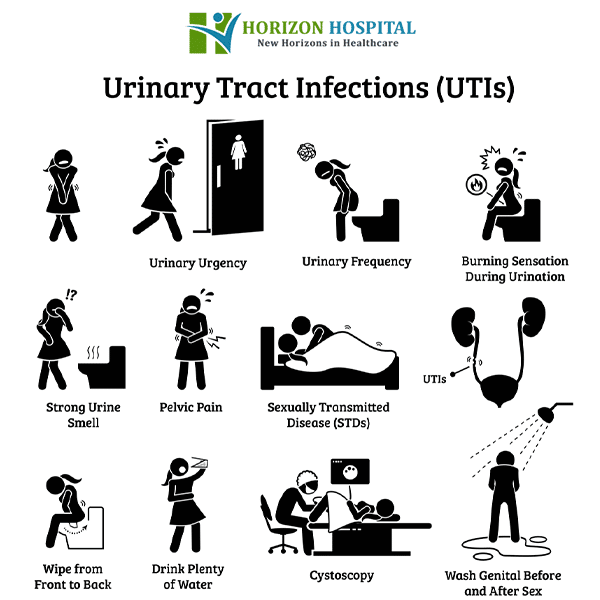
Urinary Tract Infections (UTIs): What Are the Hidden Causes
Urinary Tract Infection UTI is potentially a very painful condition whereby the bacteria in the urinary tract pose a health risk. Symptoms range from pain and intense pressure to fever and chills. If you experience continual pain even after emptying your bladder and are not able to do your normal activities, then maybe it’s time for an evaluation with your healthcare provider.
Read about the most common causes of UTIs, their symptoms, and preventative measures to take on this blog post!
An introduction on urinary tract infections and the symptoms
Urinary tract infections (UTIs) are one of the most common types of infections. They’re caused when bacteria enter the urinary tract and multiply. UTIs can occur in any part of the urinary system, including the kidneys, ureters, bladder, or urethra.
Most UTIs are caused by a bacterium called Escherichia coli (E. coli), which is found in the intestine. Other bacteria that can cause UTIs include Klebsiella, Enterococcus, and Pseudomonas. These bacteria can enter the urinary tract through the urethra and travel up to the bladder, where they multiply and cause an infection.
Symptoms of a UTI include a strong urge to urinate, a burning sensation during urination, cloudy or bloody urine, and a low-grade fever. If left untreated, a UTI can cause serious complications, such as kidney damage or bloodstream infections.
There are several things you can do to protect yourself from UTIs. Drink plenty of fluids to flush out bacteria from your system. Urinate frequently to empty your bladder completely and avoid holding in urine. Wipe from front to back after using the restroom to prevent bacteria from spreading from your anus to your urethra.
The causes of Urinary Tract Infection UTI's and how to possibly prevent these:
There are many different causes of UTIs, some of which may be hidden. Here are a few possible causes and tips on how to prevent them:
Not drinking enough fluids. This can cause the bladder to become irritated and more susceptible to infection. Make sure to drink plenty of fluids, especially water, throughout the day.
Wiping from back to front after using the toilet. This can transfer bacteria from the anal area to the urethra. Always wipe from front to back.
Use of feminine hygiene products. Scented sprays, powders, and douches can irritate the vagina and urethra. It is best to avoid these or use them sparingly.
Sexual activity. This can introduce bacteria into the urethra. Urinating before and after sex can help flush out bacteria. The use of condoms can also help reduce the risk of infection.

If you are susceptible to UTI’s, there are a few things you can do to help prevent them:
- Drink plenty of fluids, especially water.
- Wipe from front to back after using the toilet.
- Avoid use of scented feminine hygiene products.
How you can reduce your risk of getting a UTI:
There are a number of things you can do to reduce your risk of getting a UTI, including:
- Drink plenty of fluids. Drinking water helps flush out bacteria from your urinary tract.
- Wipe from front to back after using the restroom. This helps prevent bacteria from your anus from spreading to your urethra.
- Urinate frequently. urinating frequently helps clear bacteria from your urinary tract before it can cause an infection.
- Avoid douching. Douching can disrupt the normal balance of bacteria in your vagina and increase your risk of UTI.
- Avoid feminine hygiene sprays and scented pads or tampons. These products can irritate your urethra and increase your risk of UTI.
- Urinate after sex. This helps flush out any bacteria that may have been introduced during intercourse
What you should do if you think you have a UTI:
If you think you may have a Urinary Tract Infection UTI, it is important to see a healthcare provider as soon as possible. A UTI can cause serious health problems if it is not treated promptly and properly.
There are several things you can do to protect yourself from getting a UTI. First, be sure to drink plenty of fluids, especially water, to keep your urine diluted and flowing smoothly. Secondly, avoid holding in your urine for long periods of time; urinate when you feel the urge. Thirdly, practice proper hygiene by wiping from front to back after using the restroom to prevent bacteria from entering the urethra. And lastly, void after intercourse to help flush out any bacteria that may have been introduced during sexual activity.
If you do develop a UTI, treatment typically involves antibiotics. Be sure to take all of the medication as prescribed, even if your symptoms go away before you finish the course of antibiotics. Failure to do so can lead to recurrent UTI infections.
Advantages of UTIs Prevention
The best way to prevent a Urinary Tract Infection UTI is to drink plenty of fluids and urinate often. This helps flush out bacteria that may be present in the urinary tract. Additionally, it is important to practice good hygiene by wiping from front to back after using the restroom. This helps prevent bacteria from entering the urethra. Lastly, it is important to choose cotton underwear and avoid tight-fitting clothing.
Conclusion:
Understanding the hidden causes of UTIs is important for protecting yourself from this potentially painful and troublesome condition. Although some of the causes are out of your control, there are many things you can do to reduce your risk. Be sure to drink plenty of fluids, urinate regularly, and wipe front to back after using the restroom. You should also avoid holding in your urine for too long and practice good hygiene by cleaning your genital area daily. If you have any concerns or think you may have a UTI, be sure to see a doctor right away.
Contact us today to schedule an appointment with the best urologist in Lahore.
